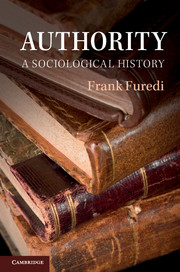Book contents
- Frontmatter
- Contents
- Preface
- Introduction: always in question
- 1 Thersites and the personification of anti-authority
- 2 Socrates and the quest for authority
- 3 Rome and the founding of authority
- 4 Augustus: a role model for authority through the ages
- 5 Medieval authority and the Investiture Contest
- 6 Medieval claim-making and the sociology of tradition
- 7 Reformation and the emergence of the problem of order
- 8 Hobbes and the problem of order
- 9 The rationalisation of authority
- 10 The limits of the authority of the rational
- 11 Taming public opinion and the quest for authority
- 12 Nineteenth-century authority on the defensive
- 13 Authority transformed into sociology's cause
- 14 The rise of negative theories of authority
- 15 By passing authority through the rationalisation of persuasion
- 16 In the shadow of authoritarianism
- Conclusion: final thoughts
- Bibliography
- Index
- References
12 - Nineteenth-century authority on the defensive
Published online by Cambridge University Press: 05 June 2014
- Frontmatter
- Contents
- Preface
- Introduction: always in question
- 1 Thersites and the personification of anti-authority
- 2 Socrates and the quest for authority
- 3 Rome and the founding of authority
- 4 Augustus: a role model for authority through the ages
- 5 Medieval authority and the Investiture Contest
- 6 Medieval claim-making and the sociology of tradition
- 7 Reformation and the emergence of the problem of order
- 8 Hobbes and the problem of order
- 9 The rationalisation of authority
- 10 The limits of the authority of the rational
- 11 Taming public opinion and the quest for authority
- 12 Nineteenth-century authority on the defensive
- 13 Authority transformed into sociology's cause
- 14 The rise of negative theories of authority
- 15 By passing authority through the rationalisation of persuasion
- 16 In the shadow of authoritarianism
- Conclusion: final thoughts
- Bibliography
- Index
- References
Summary
The defensive discourse on public opinion offered a medium through which anxieties about the cultural and moral devaluation of authority could be communicated. In the nineteenth century the loss of cultural support for authority was shown by the fact that it was increasingly presented as a principle that was inferior to freedom. Moreover, the couplets of Authority versus Truth and Authority versus Reason cast doubts on its moral and intellectual credibility. The erosion of cultural valuation for authority was captured rhetorically through concepts such as ‘the principle of authority’ and ‘authoritarian’.
The language through which authority was expressed had become ambiguous and evasive. This trend was exemplified in the nineteenth century through the concept ‘principle of authority’, which, though frequently used in public discussions and the press, was rarely defined. For example, London's The Times referred to the principle of authority in a manner that suggested its readers would readily understand the term. In France, the term la principe d'authorité was used by the leading anarchist Proudhon, and in Germany, the word Autoritätsprinzip was widely used by theologians and social commentators. Friedrich Engels referred to it in his article ‘On Authority’ and Rudolph Sohm, who influenced the development of Weber's theory of charisma, used the term in his 1892 discussion of charismatic authority.
- Type
- Chapter
- Information
- AuthorityA Sociological History, pp. 273 - 298Publisher: Cambridge University PressPrint publication year: 2013



